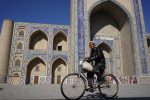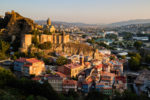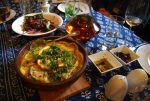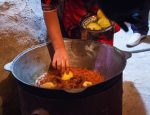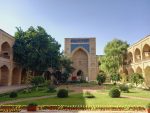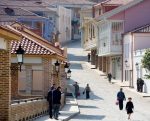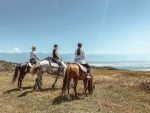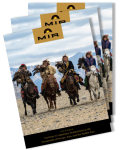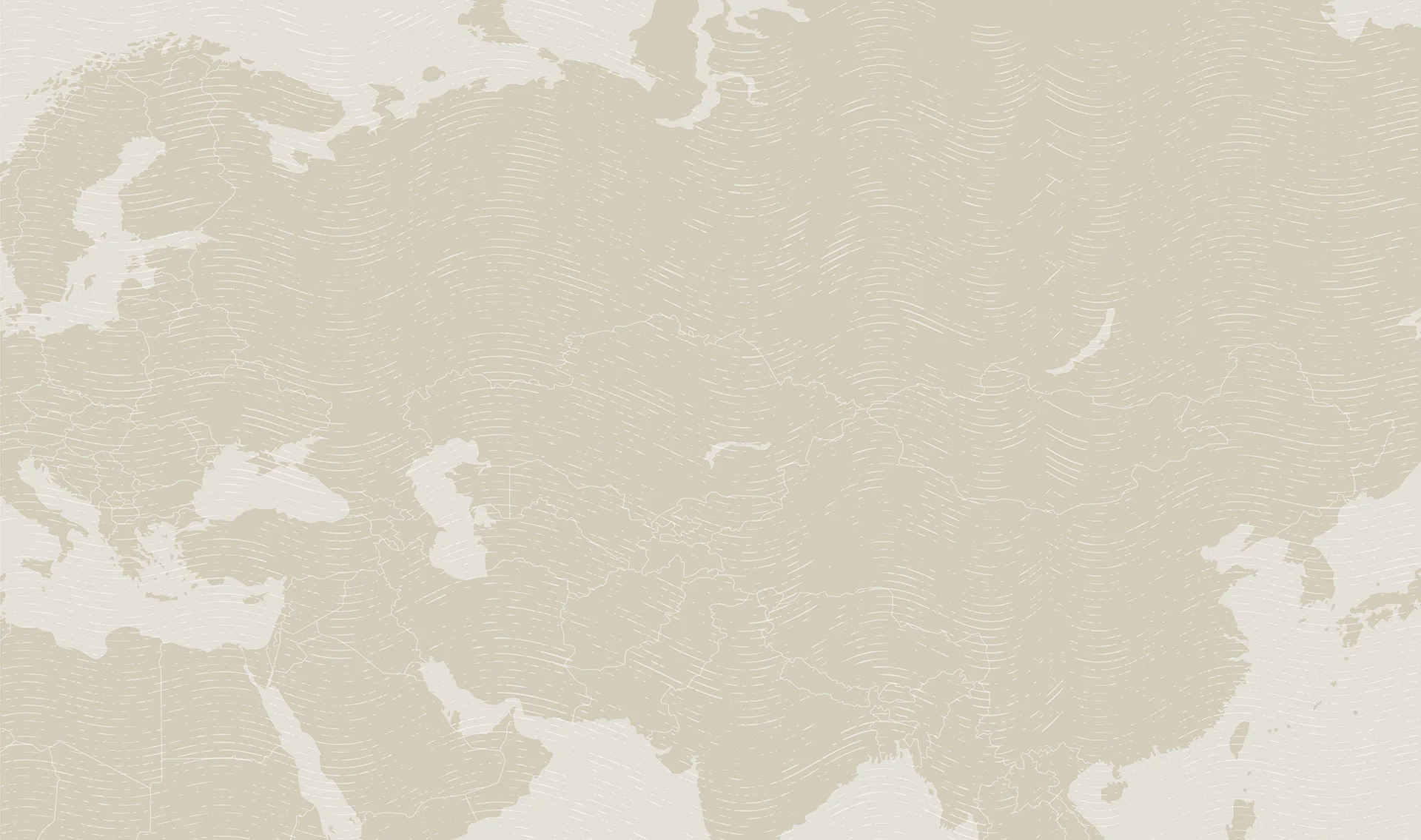Essential Uzbekistan & Georgia
Photo credit: Donovan Wong
Heritage of the Silk & Spice Routes
Overview
At first glance Georgia and Uzbekistan may seem an unlikely pairing. The two nations are separated by the Caspian Sea and expansive deserts. One is predominately Christian and home to diverse languages in the obscure Kartvelian language family. The other is largely Muslim and Turkic-speaking. Though differences abound, on the ground and close-up, the similarities become more apparent. Threads of history and culture woven by the historical caravans of the Silk Road and by modern Soviet influence unite these cultures in unexpected and interesting ways, yielding two of the most exciting destinations in Eurasia.
Your journey starts in the ancient Timurid capital of Samarkand, now home to Uzbekistan’s most monumental architecture. Move on by train to explore the labyrinthine Old Town of Bukhara. Then head to Georgia by way of the Uzbek capital, Tashkent. In Georgia touring focuses on the vibrant capital Tbilisi, the spectacular mountains near Kazbegi, and the wine-growing region of Kakheti. Through it all enjoy the differences and diversity, while teasing out the common threads.
Travels to: Uzbekistan, Georgia

Map

Itinerary
-
Days 1-2: Samarkand (Uzbekistan)

The trip begins in Samarkand, the conqueror Tamerlane’s ancient capital, hailed by UNESCO as “the crossroad of cultures.” Visit the gracefully proportioned Registan Square, the final resting place of Tamerlane, massive Bibi Khanum Mosque, and the animated Siab Bazaar. You’ll also venture out to the Gissar foothills for an optional light hike through sheep herder trails on your way to the village of Ohalik.
HIGHLIGHTS
- UNESCO-listed Samarkand’s Registan Square, bordered by three beautiful madrassahs
- Tamerlane’s final resting place, Gur-Emir Mausoleum
- Babur’s musical instruments studio at Registan Square
- Studio of internationally recognized fashion designer Valentina Romanenko
- Visit to Ohalik Village for an optional light hike and meeting with a local family
- Massive Bibi Khanum Mosque, the largest of its day
- Workshop where handcrafted paper is made according to traditions handed down from the 8th century
-
Days 3-5: Bukhara

Catch a high-speed train to Bukhara, Central Asia’s most ancient living city. Its UNESCO-listed Old Town encompasses more than 140 protected monuments, including the Lyabi-Hauz Plaza at the heart of the city and the Ark Citadel, Bukhara’s original fortress. Venture outside Bukhara to a village studio specializing in the art of suzani – decorative, richly colored embroidered textiles created by hand using needles, naturally dyed silk threads, and basma and chain stitches.
HIGHLIGHTS
- Old Bukhara’s ageless domed bazaars and its central Lyabi-Hauz Plaza, adorned with a reflecting pool
- Ark Citadel, Bukhara’s giant ancient fortress
- Private studio of a master marionette-maker
- Plov making demonstration at the home of a local family
- 10th century resting place of Ismail Samani, founder of the Persian Samanid Dynasty
- 12th century Kalon assembly, also called the Bukhara Forum
- Covered trade domes filled with deep stacks of vivid handwoven carpets, felt hats, exotic jewelry, and gorgeous embroidered suzani
- Village studio to see a demonstration in the art of suzani from start to finish
-
Days 6-7: Tashkent, Tbilisi (Georgia)

After catching the train to Tashkent and an overnight in Uzbekistan’s capital and largest city, fly on to picturesque Tbilisi, Georgia’s capital. Browse the Dry Bridge Market and the wonderful high-quality handcrafted goods at Gallery 27, explore the art nouveau Sololaki District, follow the winding streets of the red-roofed Old Town, stroll down Tbilisi’s broad main thoroughfare Rustaveli Avenue, and stop at the historic churches of Anchiskhati Basilica and Sioni Cathedral.
HIGHLIGHTS
- The art nouveau Sololaki District, built in the 19th and early 20th centuries and now the city’s up-and-coming restaurant district
- The elaborately carved balconies and domed sulfur baths of Tbilisi’s Old Town
- The frescoes of 6th century Anchiskhati Basilica, Tbilisi’s oldest church
- People-watching and window-shopping on Rustaveli Avenue
- Some of the country’s most significant archaeological finds at the Simon Janashia Museum of Georgia
-
Days 8-9: Mtskheta, Kazbegi, Telavi

Ascend into the heart of the Caucasus Mountains along the scenic Georgian Military Highway, built in the early 19th century and still the main road through the region. Along the way explore UNESCO-listed Mtskheta, capital of the eastern Georgian kingdom of Iberia from the 3rd century BC through the 5th century AD, and stop at the 17th century Ananuri Fortress complex. Soak in the scenic views of one of the Caucasus’s highest peaks – Mt. Kazbek – in Kazbegi, visit the Church of Tsminda Sameba (the Holy Trinity), and check out the stone sculptures in the beautiful Sno Valley before continuing on to Georgia’s primary wine-growing region of Kakheti.
HIGHLIGHTS
- Mtskheta’s two exceptional early Orthodox churches, the 6th century Jvari Monastery and 11th century Svetitskhoveli Cathedral
- Ananuri Fortress and neighboring Zhinvali Reservoir, which together make one of Georgia’s prettiest settings
- Gorgeous mountain drives on the Georgian Military Highway
- The remote 14th century Church of Tsminda Sameba silhouetted against towering mountain peaks
- Fresh mountain air and exceptional views at the alpine village of Gudauri
- Workshop of a ceramicist who makes qvevri, the 200-900 gallon earthenware vessels used for fermenting and storing Georgian wine
- Experiencing Georgian wine at its best during a wine tasting and lunch at Lagazi Winery in the village of Alvani
-
Days 10-13: Qedeli, Signagi, Tbilisi

Charming Qedeli will be home-base for the next few days. The village is home to a small horse ranch from which you can take in picturesque views of rolling green hills dotted with small churches and flocks of sheep. Enjoy exploring the esteemed wine region of Kakheti with visits to the hill town of Signagi and the 9th century Bodbe Monastery. Complete your circuit of Georgia’s mountains and wine country with a return to Tbilisi for your last overnight before departing.
HIGHLIGHTS
- Optional horseback riding or hiking through the villages, forests, and rolling hills in the Kakhetian countryside
- A tasting of Georgian craft beers at Lost Ridge Brewing, Georgia’s first village craft brewery
- The basilica and gardens of Bodbe Monastery
- Walking tour of the hill-town of Signagi
- Small stone family home and exhibition hall of Niko Pirosmani, Georgia’s beloved painter
- Learn about the cultivation of silk worms at the home of Lamara Bezhashvili, who loves to share her encyclopedic knowledge
Dates & Prices
Please note:
- Private trip prices vary by season and are subject to hotel availability for your travel dates.
- Listed prices below are based on double occupancy and a 2 traveler minimum.
- Hotel upgrades, additional nights, and solo traveler prices are available on request.
Land tour price, per person, starting from:
Call for dates and prices
What's Included
-
Tour Includes
- Accommodations as noted in the itinerary. All room types, even in upgraded properties, are standard entry-level doubles or twins. Please call for room category upgrade pricing and information.
- Meals, as noted in the itinerary: 12 breakfasts, 3 lunches and 2 dinners.
- Restaurant tips for included meals.
- One arrival and one departure airport transfer. (Additional arrival and departure transfers available at additional cost.) MIR will arrange for travelers to be met upon arrival and seen off on departure, whether we make your air arrangements or not.
- Ground transportation throughout itinerary by private vehicle (size of vehicle depends on number of travelers in your group).
- Evening cultural performances per the itinerary.
- Guided sightseeing tours and entrance fees as outlined in itinerary.
- Services of experienced, English-speaking local guides, drivers, and other staff.
- Complete pre-departure electronic document that includes detailed packing suggestions, reading list links, country-specific information, maps, travel tips and more.
- Assistance booking your custom flight arrangements (on request; please note that international airfare is not included in the land tour cost).
- Electronic final update bulletin, with any late news, updates and important information.
-
Not Included
- Internal airfare (internal airfare is quoted separately and is subject to change by airlines).
- International airfare or taxes/fuel surcharges.
- Meals not specified as included in the itinerary.
- Single supplement charge, if requested or required.
- Baggage handling.
- Items of a personal nature (phone calls, email, laundry, alcohol, excess baggage, etc).
- Gratuities to local guides and drivers; nor to Uzbek National Guide if adding this service.
- Visa/passport fees, airport departure fees.
- Expenses incurred as a result of delay, modification or extension of a tour due to causes beyond MIR’s control.
- Travel and trip cancellation insurance.
Activity Level
-
Level 3: Medium, but Customizable
Level 3: Medium, but Customizable
This ‘Essential’ itinerary designed for private travel features long days walking and standing, some long days of overland travel, some stair climbing, unpaved sidewalks and streets, uneven surfaces and steps, absent handrails, and lack of elevators. While some of these challenges are inherent in the destinations and sites, as one of our Essential Series programs this trip can be modified as needed for those travelers who are looking for a less challenging (or more challenging) program.
There is a significant amount of touring on foot, and those travelers planning to take the program as written should be able to walk one to two miles a day comfortably. Footing can be an issue and travelers should be able to negotiate streets of packed dirt, cobblestones, uneven surfaces (possibly steep and/or wet), and deal with situations without handrails or ramps. Some attractions are only accessible via steep staircases. Museums rarely have elevators.
Past travelers have encountered challenges with bureaucratic service, plumbing in and out of hotels, and availability and quality of public restrooms. Accommodations in the basic program will vary from superior tourist class to simple and basic small private hotels (often referred to locally as bed-and-breakfasts). Upgrades may be available in some cities, please call for details. Air-conditioning is a luxury and may not be available everywhere.

